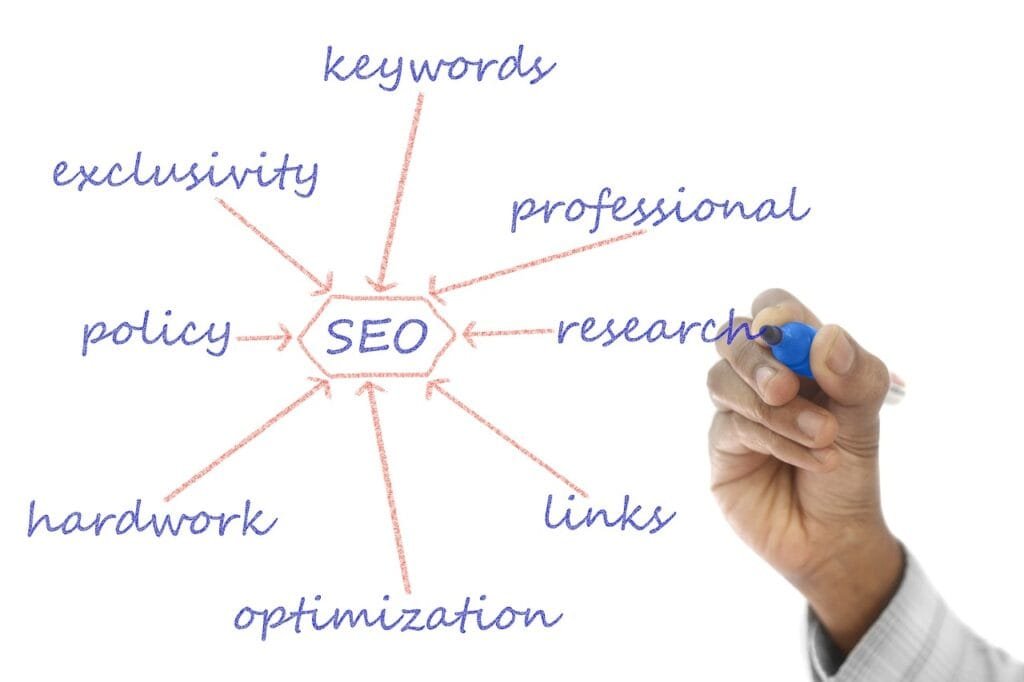This Article has been revised, edited and added to, by Poulomi Chakraborty.
- Keyword Research – Your First Step to Demystifying Estate Tax
- The Significance of Keyword Research
- Tools of the Trade
- Crafting a Keyword Strategy
- The Art of Keyword Segmentation for Enhanced Relevance
- Leveraging Competitor Analysis to Uncover Keyword Gaps
- The Integration of Semantic Search Principles
- Strategic Use of Keyword Research Tools for Advanced Insights
- A Strategic Blueprint for Startups
- Content Creation – Crafting Narratives that Resonate
- Understanding the Estate Tax Landscape
- Building a Repository of Resourceful Guides
- Engaging Blog Posts
- Unleashing the Power of Storytelling in Estate Tax Communication
- Integrating Interactive Content for Enhanced Engagement
- Harnessing Video Content to Simplify Complex Concepts
- Creating a Collaborative Content Ecosystem
- Leveraging User-Generated Content to Build Community
- A Strategic Vision for Content Excellence
- Link-Building – Crafting Pathways of Trust
- The Foundations of Link-Building
- Leveraging Guest Posts
- Building a Community Through Forums and Comments
- Cultivating High-Quality Partnerships for Backlinking
- Innovating with Linkable Assets
- Leveraging Local SEO for Community Trust
- Nurturing an Eco-System of Reciprocal Linking
- Emphasizing the Quality of Content Over Quantity of Links
- Strategic Link-Building as a Catalyst for Growth
- Analytics – Steering Through a Data-Driven Lens
- The Potency of Google Analytics
- SEO Dashboards
- A/B Testing
- Decoding Audience Insights for Tailored Content Strategies
- Implementing Predictive Analytics for Forward-Thinking SEO
- Optimizing User Experience with Behavioral Analytics
- Enhancing Content Visibility with SERP Analysis
- Integrating Social Media Analytics for Comprehensive Engagement Insights
- Analytics as the Compass for Strategic SEO Navigation
- The Future Frontier – Gazing into the SEO Horizon
- Emerging Technologies and SEO
- Sustainability in SEO
- Community Engagement and User Experience
- Embracing the Shift to Mobile-First Indexing
- The Rise of Visual and Voice Search
- Leveraging AI for Personalized User Experiences
- Prioritizing E-A-T in Content Creation
- Sustainable SEO: Building for Longevity
- Navigating the SEO Horizon with Strategic Vision
- Conclusion
In the ever-evolving landscape of tax regulations, understanding the nuances of estate tax stands as a crucial necessity for individuals and families worldwide. Nestled at the intersection of financial planning and legal foresight, estate tax management requires a deep-seated understanding of the various components that govern its mechanisms.
However, the complex labyrinth of estate tax is not just about numbers and legalities; it’s a subject that is deeply interwoven with one’s life narrative, laden with dreams, achievements, and the legacy one aims to leave behind. Thus, unraveling its intricacies should not only be an endeavor steeped in financial expertise but one forged in clarity, empathy, and foresight.
In this comprehensive guide, we will traverse a carefully curated pathway, exploring foundational elements such as keyword research and content creation, and venturing into advanced terrains of link-building and analytics. Each segment promises to foster a deep understanding while championing user engagement through SEO brilliance.
Keyword Research – Your First Step to Demystifying Estate Tax

The Significance of Keyword Research
In the expansive world of digital information, keyword research emerges as the compass that guides users through the sea of information to the shore of clarity and understanding. As we embark on this journey, we underline the pivotal role of keyword research in:
- Understanding Your Audience: Gain insights into the queries and concerns of your potential audience, tailoring content to answer their most pressing questions regarding estate tax.
- Content Strategy: Build a cohesive content strategy that addresses both broad and niche topics within the estate tax landscape, offering a well-rounded understanding.
Tools of the Trade
As we delve deeper, it becomes essential to acquaint oneself with the tools that can aid in a nuanced keyword research process. We explore the functionalities and benefits of tools such as:
- Google Keyword Planner: Unearth the potential of this tool in finding keywords that are not only relevant but have a high search volume, ensuring that your content reaches the maximum number of interested users.
- SEMrush: Learn the dynamics of SEMrush, a tool that promises a comprehensive keyword analysis, offering insights into the competitive landscape, and helping in carving out a unique space in the digital ecosystem.
Crafting a Keyword Strategy
As we progress, we find that crafting a keyword strategy stands as an art, requiring a delicate balance between various elements:
- Long-tail Keywords: Unravel the potential of long-tail keywords, which promise to attract a more targeted audience, answering specific queries with precision.
- Local SEO: Discover the importance of local SEO, a strategy that allows for a personalized approach, catering to the regional nuances of estate tax regulations.
The Art of Keyword Segmentation for Enhanced Relevance
Keyword segmentation stands as a cornerstone in refining your SEO strategy. This approach involves categorizing keywords not just by their volume or competition but by their relevance to different stages of your audience’s journey. Start by identifying the intent behind search queries—whether they are informational, navigational, or transactional.
This segmentation enables startups to craft content that aligns with the specific needs and moments of their audience’s decision-making process. By doing so, startups position themselves as authoritative guides in the estate tax landscape, leading users from curiosity to clarity.
Leveraging Competitor Analysis to Uncover Keyword Gaps
For startup founders, understanding the competitive landscape is crucial. Competitor analysis in the context of keyword research involves identifying the keywords your competitors rank for, which you may have overlooked. Tools like Ahrefs or Moz offer insights into the keywords driving traffic to your competitors’ sites.
By analyzing these, startups can identify gaps in their own content strategy and opportunities to create content that fills these voids. This not only enhances your SEO but also positions your startup as a comprehensive resource for estate tax understanding, covering angles competitors may have missed.
The Integration of Semantic Search Principles
Semantic search principles focus on the context and intent behind search queries, rather than just the literal matching of keywords. For startups, integrating semantic search into your keyword research means identifying related topics and questions your target audience might have about estate tax. Google’s “People also ask” feature and related searches are invaluable for this.
By incorporating these insights into your content, you make it more robust and likely to satisfy a wider array of search intents. This strategic depth ensures your content resonates more profoundly with users, driving engagement and positioning your startup as a thought leader in the estate tax domain.
Strategic Use of Keyword Research Tools for Advanced Insights
While the basics of using keyword research tools have been covered, there’s a strategic layer that startups, particularly in the complex field of estate tax, should exploit. Beyond the usual metrics, look into the trend data and geographic specificity offered by these tools. For instance, Google Trends can reveal the cyclical nature of certain estate tax-related queries, allowing you to time your content for maximum impact.
Moreover, focusing on geographically specific keywords can uncover localized estate tax concerns, offering a tailored approach to audience engagement. This strategic use of keyword tools not only amplifies your reach but also enhances user experience by providing timely and relevant content.
A Strategic Blueprint for Startups
Incorporating these advanced keyword research strategies into your startup’s SEO efforts for understanding estate tax implications is more than a tactical move—it’s a strategic necessity. By focusing on keyword segmentation, leveraging competitor insights, embracing semantic search, and utilizing advanced features of keyword tools, startups can achieve a nuanced understanding of their audience’s needs.
This not only elevates your content strategy but also establishes your startup as a trusted advisor in the estate tax arena, ensuring that your digital footprint grows in both size and significance.
Content Creation – Crafting Narratives that Resonate

Understanding the Estate Tax Landscape
Before we immerse ourselves in the creation of rich content, it’s pivotal to have a deep-seated understanding of the estate tax landscape. This includes exploring:
- Historical Context: Offer readers a glimpse into the historical background of estate tax, nurturing a deep-rooted understanding that spans beyond mere figures and percentages.
- Global Perspectives: Equip readers with a global perspective on estate tax, opening up horizons to understand different tax infrastructures across various countries.
Building a Repository of Resourceful Guides
As we delve deeper, we emphasize creating a reservoir of guides that cater to different facets of estate tax. This involves:
- Step-by-step Guides: Develop comprehensive guides that take readers on a step-by-step journey through the intricate process of understanding and planning around estate tax implications.
- Case Studies: Engage your audience with real-life case studies, offering a practical lens to the theoretical aspects discussed, helping them relate and understand the implications on a personal level.

Related: Check out our free SEO suite

Engaging Blog Posts
Beyond guides, it’s crucial to foster engagement through blog posts that offer fresh perspectives on estate tax, touching upon:
- Expert Interviews: Bring in industry experts for interviews, fostering a space where insights are shared and complex topics are broken down into digestible pieces, aiding a smoother understanding for the readers.
- Infographics: Leverage the power of visual content through infographics that depict complex data in a simplified manner, promoting a quicker and more efficient understanding of the nuances of estate tax.
Unleashing the Power of Storytelling in Estate Tax Communication
Storytelling is a potent tool for making complex subjects like estate tax more relatable and understandable. Start by sharing real-life stories of how estate planning has impacted individuals and businesses. These narratives can showcase challenges overcome, mistakes to avoid, and the tangible benefits of informed estate tax planning. By presenting estate tax concepts through personal stories, startups can foster a deeper connection with their audience, encouraging them to engage more profoundly with the content.
Integrating Interactive Content for Enhanced Engagement
Interactive content, such as quizzes, surveys, and calculators, can transform passive readers into active participants. For instance, an estate tax calculator allows individuals to input their own data to see potential tax implications, making the information highly personalized and immediately relevant. Interactive content not only boosts engagement but also provides valuable insights into your audience’s needs and preferences, enabling startups to tailor future content even more effectively.
Harnessing Video Content to Simplify Complex Concepts
Video content has emerged as a highly effective medium for explaining complex topics. Through video, startups can break down estate tax principles into digestible, easy-to-understand segments. Use animations to illustrate how estate tax works, interviews with experts to answer common questions, or step-by-step guides for navigating estate planning. Videos can make the learning process more engaging and accessible, helping demystify estate tax for a wider audience.
Creating a Collaborative Content Ecosystem
In the digital age, content creation does not have to be a solitary endeavor. Startups can collaborate with financial advisors, legal experts, and even other startups to produce comprehensive, multidisciplinary content. These collaborations can take the form of guest blogging, co-hosted webinars, or joint research projects. Such a collaborative approach not only enriches the content’s depth and breadth but also extends its reach to the audiences of your collaborators, effectively broadening your startup’s visibility in the process.
Leveraging User-Generated Content to Build Community
Encouraging user-generated content is another strategy to deepen engagement and build a community around your content. Invite your audience to share their own stories related to estate planning, questions they may have, or topics they want more information on. This can be facilitated through comment sections, forums, or social media platforms. User-generated content not only provides valuable insights into your audience’s interests and concerns but also fosters a sense of belonging and community among readers.
A Strategic Vision for Content Excellence
For startups aiming to illuminate the complexities of estate tax, embracing these innovative content creation strategies is crucial. From leveraging the power of storytelling and interactive content to harnessing video for complex concepts, creating collaborative ecosystems, and encouraging user-generated content, startups can craft narratives that resonate on a deeper level. This strategic approach to content creation will not only enhance understanding of estate tax implications but also establish your startup as a trusted, authoritative voice in the field.
Link-Building – Crafting Pathways of Trust

The Foundations of Link-Building
As we immerse ourselves in the link-building landscape, we establish the foundational strategies that promise to foster trust and facilitate a deeper understanding of estate tax. Let’s delve into:
- Internal Linking: Explore the dynamics of internal linking, where we illustrate the potential of steering readers through a curated journey of understanding, deepening their knowledge pool through interconnected content pieces.
- Backlinking: Unveil the potent strategy of backlinking, where we craft alliances with authoritative sources, inviting a flow of credibility and trust into our digital repository.
Leveraging Guest Posts
Delving deeper, we focus on leveraging guest posts as a powerful tool in link-building. We shed light on:
- Collaborative Content: Dive into the collaborative world of guest posts, where we foster partnerships with industry experts, enriching our content landscape with diverse perspectives and insights.
- SEO Boost: Uncover the SEO advantages of guest posting, showcasing how it aids in increasing domain authority and fostering organic growth, paving the way for a wider and more engaged readership.
Building a Community Through Forums and Comments
As we venture forth, we underline the significance of building a community through active participation in forums and insightful commenting. This chapter is dedicated to:
- Engaging with the Audience: Learn the art of engaging with the audience through forums and comments, crafting a space where readers can voice their queries, and find personalized responses, fostering a community of learning and growth.
- Feedback Loop: Establish a feedback loop through community engagement, where readers’ insights and queries become a rich source of content ideas, nurturing a content landscape that is both dynamic and responsive to the readers’ needs.
Cultivating High-Quality Partnerships for Backlinking
The essence of building trust through backlinks lies in the quality of partnerships startups choose to cultivate. Instead of pursuing a high quantity of backlinks, focus on securing high-quality links from websites that are not just authoritative but also relevant to the estate tax and financial planning sectors. This involves identifying and reaching out to industry leaders, reputable financial blogs, and specialized forums where your target audience seeks advice.
Establishing partnerships through guest blogging, joint webinars, or co-authored white papers can result in backlinks that significantly boost your SEO while also enhancing your reputation as a knowledgeable resource in estate tax planning.
Innovating with Linkable Assets
Creating linkable assets goes beyond the traditional blog post or article; it involves developing resources that provide immense value to your audience and, by extension, to other content creators who wish to reference your work. This could include comprehensive guides, original research studies, infographics detailing estate tax changes, or interactive tools like estate tax calculators.
By offering something unique and highly valuable, startups encourage organic linking, as other sites recognize the value of directing their audience to these resources. This strategy not only improves SEO but also positions your startup as an innovative leader in the estate tax domain.
Leveraging Local SEO for Community Trust
For startups, local SEO should not be overlooked as a pivotal component of the link-building strategy. Engaging with local chambers of commerce, participating in community events, and getting listed in local business directories can lead to valuable backlinks.
Moreover, creating content that addresses the specific estate tax concerns of your local community can attract backlinks from local news outlets and community blogs. Local SEO not only helps in building a foundation of trust within your immediate community but also improves your visibility to a local audience actively seeking estate tax advice.
Nurturing an Eco-System of Reciprocal Linking
While securing backlinks is crucial, fostering an ecosystem where reciprocal linking is common practice can amplify your link-building efforts. This doesn’t mean engaging in link exchange schemes but rather building genuine relationships with complementary businesses and industry bloggers where sharing each other’s content becomes beneficial for both parties.
For example, a startup specializing in estate tax software might collaborate with a legal advice blog, sharing insights and referencing each other’s content where relevant. This reciprocal approach not only enhances SEO but also broadens your content’s exposure to relevant audiences.
Emphasizing the Quality of Content Over Quantity of Links
In the pursuit of building pathways of trust through link-building, the quality of the content being linked to cannot be overstated. High-quality, informative, and engaging content naturally attracts backlinks, as it’s seen as valuable for others to reference.
Focus on creating content that addresses the pain points of your target audience, provides actionable advice, and presents the complex topic of estate tax in an accessible manner. When the content resonates with readers, other websites, including influencers and thought leaders in the financial sector, are more likely to link to it, thereby organically building your startup’s credibility and authority.
Strategic Link-Building as a Catalyst for Growth
For startups navigating the complexities of estate tax implications, strategic link-building is not just about enhancing SEO; it’s about crafting pathways of trust that lead audiences directly to your digital doorstep.
By focusing on cultivating high-quality partnerships, creating linkable assets, leveraging local SEO, nurturing a reciprocal linking ecosystem, and prioritizing content quality, startups can build a robust link-building strategy that not only improves search engine rankings but also establishes their brand as a trusted authority in the estate tax sphere. This strategic approach to link-building promises to lay a solid foundation for sustained growth and visibility in the digital landscape.
Analytics – Steering Through a Data-Driven Lens

The Potency of Google Analytics
At the inception of our analytical journey, we introduce readers to the potent tool that is Google Analytics. Here we explore:
- User Behavior Analysis: Deep-dive into the functionalities of Google Analytics, illustrating how it aids in understanding user behavior, guiding content creators in crafting narratives that resonate with the audience.
- Performance Metrics: Unravel the dynamics of performance metrics, offering a lens to gauge the effectiveness of various SEO strategies, providing a roadmap for further refinement.
SEO Dashboards
As we delve further, we turn our focus to SEO dashboards, bringing to fore their role in offering a consolidated view of various metrics. This section elucidates:
- Custom Reports: Guide readers in creating custom reports that offer focused insights into specific aspects of the SEO strategy, aiding in a detailed analysis that fosters growth.
- Real-time Monitoring: Showcase the functionalities of real-time monitoring offered by SEO dashboards, encouraging a proactive approach in SEO strategy implementation, ensuring optimal performance at all times.
A/B Testing
Towards the latter part of our analytical exploration, we delve into the world of A/B testing, emphasizing its role in fine-tuning the SEO strategies. Here, we offer insights into:
- Experimentation: Encourage a culture of experimentation through A/B testing, where various strategies are put to test, promising a landscape that is dynamic and responsive to user preferences.
- Optimization: Bring to light the optimization potential of A/B testing, showcasing how it aids in honing strategies to perfection, promising a user experience that is both enriching and engaging.
Decoding Audience Insights for Tailored Content Strategies
Understanding your audience is paramount in crafting content that resonates and engages. Analytics tools provide deep dives into user demographics, interests, and behavior on your site, presenting an opportunity to tailor your content strategy precisely to your audience’s needs. By analyzing which pages attract the most views, where your traffic is coming from, and the keywords driving that traffic, you can identify content gaps and opportunities for new topics or formats. This level of insight allows startups to create more targeted, relevant content that speaks directly to the interests and concerns of their audience, improving engagement and retention.
Implementing Predictive Analytics for Forward-Thinking SEO
Predictive analytics uses historical data to forecast future trends, behavior, and outcomes. For startups focused on estate tax implications, this can mean anticipating changes in search trends based on legislative changes, economic forecasts, or shifts in public interest. By integrating predictive analytics into your SEO strategy, you can stay ahead of the curve, preparing content that addresses upcoming trends and questions before they become a widespread search phenomenon. This proactive approach not only positions your startup as a thought leader but also captures new traffic as interest in these emerging topics grows.
Optimizing User Experience with Behavioral Analytics
Behavioral analytics focuses on how users interact with your site, offering critical insights into user experience (UX). Analyzing patterns like bounce rates, page session times, and navigation paths helps identify UX bottlenecks that could be hindering your site’s performance. For example, if a high percentage of users exit your site from a specific page, it may indicate a problem with content relevance, load times, or clarity. Addressing these issues can significantly improve the user experience, encouraging longer visits and deeper engagement with your content, which is beneficial for both SEO and conversion rates.
Enhancing Content Visibility with SERP Analysis
Search Engine Results Page (SERP) analysis is crucial for understanding how your content performs in the wild. By examining your rankings for specific keywords and phrases related to estate tax, you can assess the effectiveness of your SEO strategies and identify areas for improvement. Additionally, analyzing the types of content that rank highly (e.g., articles, videos, infographics) can inform your content creation strategy, guiding you towards the formats that are most likely to achieve visibility and engagement. This strategic alignment with search engine preferences amplifies your content’s reach and impact.
Integrating Social Media Analytics for Comprehensive Engagement Insights
While not traditionally viewed through an SEO lens, social media analytics can provide valuable insights into how your content resonates with audiences outside of your website. Monitoring shares, likes, comments, and mentions related to your estate tax content can offer clues about topics that generate the most interest and engagement. This feedback loop can inform not just your social media strategy but also your broader content and SEO strategies, ensuring that your efforts are aligned with audience preferences across all platforms.
Analytics as the Compass for Strategic SEO Navigation
For startups aiming to demystify estate tax through strategic SEO, analytics is not just a tool but a compass that guides every decision and action. By diving deep into audience insights, leveraging predictive and behavioral analytics, optimizing based on SERP analysis, and integrating social media insights, startups can navigate the complex SEO landscape with confidence and precision. This data-driven approach ensures that your content not only reaches its intended audience but also engages and converts them, setting the foundation for sustained growth and success in the competitive digital arena.
The Future Frontier – Gazing into the SEO Horizon

Emerging Technologies and SEO
In the inaugural section of our futuristic exploration, we delve into the nexus between emerging technologies and SEO. Let’s enlighten our readers on:
- Artificial Intelligence: Uncover the role of artificial intelligence in shaping SEO strategies of the future, exploring how AI can foster a personalized user experience, nurturing a deeper understanding of estate tax.
- Voice Search Optimization: Shed light on the increasing prominence of voice search, guiding content creators on optimizing content for voice search to remain at the forefront in the SEO landscape.
Sustainability in SEO
As we tread forward, we focus on sustainability in SEO, offering a fresh perspective on creating SEO strategies that stand the test of time. This involves:
- Evergreen Content: Educate content creators on crafting evergreen content that remains relevant over time, promising a repository of wisdom that continuously guides readers in understanding estate tax.
- Ethical SEO: Introduce the concept of ethical SEO, encouraging creators to build strategies grounded in authenticity and ethical practices, promising a digital landscape that fosters trust and reliability.
Community Engagement and User Experience
In the concluding section of our futuristic endeavor, we focus on community engagement and user experience as the bedrocks of future SEO strategies. Here, we explore:
- Interactive Platforms: Encourage creators to envision interactive platforms where users can engage dynamically, fostering a community of learning and mutual growth in the realm of estate tax understanding.
- Personalized User Journeys: Delve into the concept of personalized user journeys, encouraging creators to craft narratives that cater to individual learning pathways, offering a guided and personalized journey through the intricacies of estate tax.
Embracing the Shift to Mobile-First Indexing
The inexorable shift towards mobile-first indexing underscores the importance of optimizing your digital content for mobile users. With the majority of searches now conducted on mobile devices, ensuring your website offers a seamless, responsive experience is no longer optional—it’s imperative. This goes beyond mere responsiveness, encompassing load times, mobile user interface design, and mobile-specific content strategies. Startups should prioritize mobile SEO, tailoring their content to suit the consumption habits and preferences of mobile users, thereby enhancing visibility and engagement in mobile search results.
The Rise of Visual and Voice Search
The ascent of visual and voice search technologies presents new frontiers for SEO strategies. With devices and platforms increasingly supporting image and voice queries, startups must consider how these forms of search alter the way users find information on estate tax. This includes optimizing content for voice search by focusing on natural language processing and question-based queries, as well as leveraging image alt text and visual content strategies to capitalize on visual search trends. Adapting to these emerging search methods can position your startup at the forefront of user preferences and search engine developments.
Leveraging AI for Personalized User Experiences
Artificial intelligence (AI) is transforming SEO from a keyword-centric discipline to one driven by personalized user experiences. AI technologies enable the analysis of vast datasets to predict user behavior, tailor content recommendations, and automate personalized content delivery. For startups, integrating AI into your SEO strategy could mean developing AI-driven content that dynamically adapts to the interests and behaviors of your audience, offering personalized pathways through your estate tax content. This level of personalization not only improves user engagement but also boosts your content’s relevance and value in the eyes of both users and search engines.
Prioritizing E-A-T in Content Creation
The importance of Expertise, Authoritativeness, and Trustworthiness (E-A-T) in content creation continues to grow, especially in fields as sensitive and complex as estate tax. Search engines are increasingly prioritizing content that demonstrates deep knowledge, authoritative sources, and a trustworthy reputation. For startups, this means investing in high-quality, research-backed content, authored or reviewed by industry experts, and supported by reputable links. Fostering partnerships with established experts in the estate tax field can enhance your content’s E-A-T, elevating your search rankings and user trust simultaneously.
Sustainable SEO: Building for Longevity
As the digital landscape evolves, so too does the need for sustainable SEO strategies that withstand changes in search engine algorithms and user behaviors. This involves creating evergreen content that remains relevant and valuable over time, focusing on building a solid technical SEO foundation, and prioritizing user experience in all SEO efforts. Startups should view SEO not as a series of tactics to chase temporary rankings but as a holistic approach to building a lasting digital presence. This long-term perspective ensures that your startup remains resilient in the face of SEO’s future evolutions.
Navigating the SEO Horizon with Strategic Vision
For startup founders in the estate tax realm, the future of SEO presents both vast challenges and unprecedented opportunities. By embracing mobile-first strategies, adapting to voice and visual search, leveraging AI for personalization, prioritizing E-A-T in content creation, and committing to sustainable SEO practices, startups can navigate the shifting landscape with confidence. This strategic vision for the future of SEO ensures not just survival but leadership in the evolving digital marketplace, positioning your startup as a trusted authority in estate tax planning for years to come.
Conclusion
In wrapping up our comprehensive exploration of SEO strategies tailored to demystifying estate tax implications, it’s clear that the journey through keyword research, content creation, link-building, analytics, and future SEO innovations offers a robust toolkit for startups. Each element, from the precision of targeted keywords to the depth of engaging content, the trust built through strategic link-building, the insights gleaned from analytics, and the forward-thinking adoption of emerging SEO trends, plays a pivotal role in enhancing understanding and visibility in the complex domain of estate tax.
For startup founders, the path forward requires a commitment to these strategies, a dedication to ongoing learning, and an adaptability to the ever-evolving digital landscape. By embracing these principles, startups can not only navigate the intricacies of estate tax with greater ease but also establish themselves as authoritative voices, guiding their audiences with clarity, empathy, and expertise. The future of SEO in the estate tax realm is ripe with opportunity, and by harnessing the full spectrum of SEO tools and strategies, startups are well-positioned to lead the charge, transforming challenges into opportunities for growth and impact.
Read next:
- Sole Proprietorship vs One Person Company: Compared!
- Is The Quora Partner Program Going To Make Me Money?
- 7 Key Ways How Law Firms are Marketing Themselves: Disclosed!
- How to Hire the Best SEO Services: Industry Review
- Is The Quora Partner Program Going To Make Me Money?



















Comments are closed.